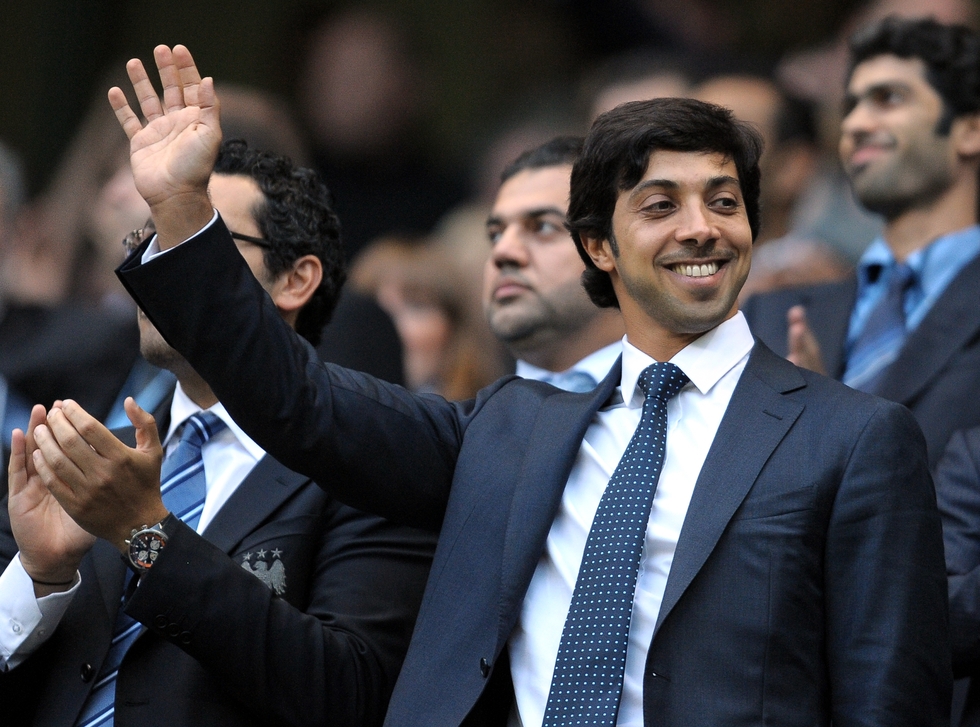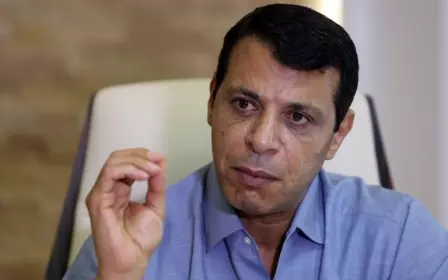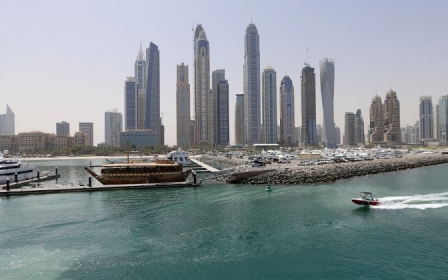Manchester leaders flag UAE rights concerns on anniversary of massacre

A powerful coalition of Manchester’s political and civic leaders have used the anniversary of the bloody Peterloo Massacre on 16 August to confront Manchester City Football Club’s Emirati owners over human rights abuses in the oil-rich kingdom.
In an open letter published on Tuesday, Manchester-based politicians, legal experts and campaign groups wrote to the club’s owner, Sheikh Mansour bin Zayed Al-Nahyan, the deputy prime minister of the United Arab Emirates, demanding the UAE release political prisoners, investigate allegations of torture and commit to respecting human rights.
The UAE has had close financial ties to Manchester since Mansour purchased the football club in 2008. He has since invested more than £1bn ($1.3bn) in the team, as UAE-backed firms signed a string of deals in the city, including a $1.3bn regeneration partnership with Manchester City Council.
However, rights groups and senior figures in Manchester, including local MPs and two high-profile barristers who represented some of the families in the inquiry into the Hillsborough football disaster, are increasingly concerned about the financial ties to one of the city's Premier League clubs, given the deteriorating human rights situation in the UAE.
The letter to Sheikh Mansour, which was coordinated by Human Rights Watch and Amnesty International, calls for an investigation into allegations of torture and for the release of Emirati human rights lawyer Mohamed al-Roken, who was sentenced to 10 years in jail in July 2013 following a huge crackdown on political and human rights activists in the UAE.
“On issues such as political participation and free speech, women’s rights and workers’ rights – issues on which Manchester has a proud history – the UAE’s record gives cause for concern,” the letter reads.
Signatories to the letter include Manchester MPs Graham Stringer, Andrew Gwynne and Rebecca Long Bailey, a close ally of Labour leader Jeremy Corbyn, as well as local council members and high-profile QCs (lawyers of high rank) Mark George and Peter Weatherby.
The two barristers are part of the legal team representing the families of 22 of the 96 people killed in the 1989 Hillsborough football stadium disaster.
In April, an inquest into the disaster delivered a verdict that the 96 Liverpool supporters had been unlawfully killed due to grossly negligent failures by police and ambulance services.
The letter continues: “In addition to our concerns about the imprisonment of Mohamed al-Roken and others like him, we have concerns about the UAE’s ongoing abuse and exploitation of migrant workers, the existence of laws that appear to tolerate the physical abuse of women, and the authorities’ exclusion from the UAE of NGOs, journalists, and academics who have criticised the UAE’s record on human rights.”
The letter evokes the 197th anniversary of the Peterloo Massacre on Tuesday, which commemorates when soldiers from a local regiment charged reform campaigners in the city in 1819, leaving 15 dead and dozens injured. It says the release of Roken would be a “fitting action” on what is an “important day for the city of Manchester”.
However, to the dismay of activists, local MP and Labour candidate for Manchester mayor Andy Burnham has failed to sign the letter – despite being approached to sign it 12 days ago.
Local campaigners are surprised by his absence, as the Labour MP has previously expressed concern over foreign ownership of football clubs and has said: "We want all our clubs in the best hands."
A spokesman for Burnham, who also serves as shadow home secretary, said the MP was unavailable for comment as he was now "away".
Burnham’s former rivals for the Labour candidacy for mayor Ivan Lewis MP and Tony Lloyd have also failed to publicly back the letter, as has local Labour MP Lucy Powell. One Labour source told Middle East Eye that the failure of some local MPs to sign the letter was a “betrayal of Labour’s campaigning heritage” in the city.
Nicholas McGeehan, senior Gulf researcher at Human Rights Watch, said: “Manchester has a rich tradition of standing up for political rights, women’s rights and the abolition of slavery, so the city’s close relationship with the UAE, which has such a poor rights record, causes alarm for those who celebrate its historic past.”
The open letter comes after MEE revealed that Human Rights Watch and Amnesty International had written to Manchester City Council leaders and Manchester City Football Club to express concern over financial ties with the UAE. Council leaders subsequently met with campaigners, but Manchester City has not responded to repeated requests for meetings and media comment.
As pressure mounts on Manchester City, senior club officials will hope that the human rights campaign doesn’t distract from efforts to challenge for top honours this season - the club is due to play Steaua Bucharest this evening in the Champions League - with Pep Guardiola, the former Barcelona coach, taking charge of the team.
Off the pitch in Manchester, there have been protests over the city council’s development partnership with the Abu Dhabi United Group (ADUG), which is owned by Mansour, and is the vehicle he used to purchase Manchester City. Campaigners in the city say the deal is allowing developers to destroy the city’s industrial heritage and replace it with often unaffordable flats.
Last week, campaigners from Manchester Shield, which calls for a “better built environment”, protested against the demolition of a 16th-century pub in the town centre as part of plans backed by ADUG.
Adam Prince, a Manchester Shield spokesperson, told MEE: “Manchester City Council is publicly committed to any anti-discriminatory practices. This is totally at odds with the United Arab Emirates human rights abuse allegations and criminal laws that affect minorities in that country.“
Neither Manchester City Council nor Manchester City Football Club responded to requests for comment.
Middle East Eye propose une couverture et une analyse indépendantes et incomparables du Moyen-Orient, de l’Afrique du Nord et d’autres régions du monde. Pour en savoir plus sur la reprise de ce contenu et les frais qui s’appliquent, veuillez remplir ce formulaire [en anglais]. Pour en savoir plus sur MEE, cliquez ici [en anglais].




